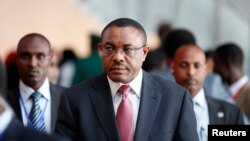ADDIS ABABA —
African leaders from the Great Lakes region met Sunday at the African Union summit in Addis Ababa to discuss progress bringing peace to the Democratic Republic of Congo. Security is high on the summit agenda, as is a proposal that could be a game-changer for the International Criminal Court case against Kenya’s president.
Fresh from celebrations for the 50th anniversary of the founding of the organization that would become the African Union, African leaders got down to business Sunday to address the conflicts plaguing the continent.
Members of the Great Lakes region met to discuss the progress of an agreement signed in February to end conflict in the eastern DRC.
The agreement was signed by 11 countries in the region including Rwanda and Uganda, who have both been accused of supporting rebellions in eastern Congo, a charge both countries deny.
Sunday’s meeting follows a resumption of fighting in eastern Congo between the M23 rebel movement and the Congolese army.
AU Commission chairwoman Nkosazana Dlamini-Zuma said the overarching aim of the agreement must be to improve lives in the region.
“We must keep in mind the ultimate goal of all our interventions to allow the people of the Great Lakes to live in harmony and peace, to use the proceeds from their natural resources to build infrastructure, social services and contribute toward a shared prosperity," she said.
The agreement helped clear the way for the deployment of an intervention force made up of soldiers from Tanzania, South Africa and Malawi to be integrated into the existing U.N. peacekeeping mission.
U.N. Secretary-General Ban Ki-moon said he was “deeply touched” during his recent trip to the region and that the framework is a good start, but more needs to be done to give hope to the people of eastern Congo.
"I think this framework agreement could be a landmark one, but it’s the minimum which we are doing. I think we should do more," he said.
Heads of state are considering the recommendations from the Peace and Security Council on other regional conflicts, including a peace agreement between Sudan and South Sudan, who are still trying to resolve final status issues remaining from their split in 2011.
Another agenda item is a proposal agreed by African foreign ministers and the AU executive council to ask the International Criminal Court to refer the case against Kenya’s leader back to the Kenyan courts.
Kenyan President Uhuru Kenyatta and his deputy William Ruto are facing separate charges of orchestrating the violence that followed the election in 2007.
The proposal to move the case has support among many African leaders who feel the ICC process unfairly targets Africans.
Fresh from celebrations for the 50th anniversary of the founding of the organization that would become the African Union, African leaders got down to business Sunday to address the conflicts plaguing the continent.
Members of the Great Lakes region met to discuss the progress of an agreement signed in February to end conflict in the eastern DRC.
The agreement was signed by 11 countries in the region including Rwanda and Uganda, who have both been accused of supporting rebellions in eastern Congo, a charge both countries deny.
Sunday’s meeting follows a resumption of fighting in eastern Congo between the M23 rebel movement and the Congolese army.
AU Commission chairwoman Nkosazana Dlamini-Zuma said the overarching aim of the agreement must be to improve lives in the region.
“We must keep in mind the ultimate goal of all our interventions to allow the people of the Great Lakes to live in harmony and peace, to use the proceeds from their natural resources to build infrastructure, social services and contribute toward a shared prosperity," she said.
The agreement helped clear the way for the deployment of an intervention force made up of soldiers from Tanzania, South Africa and Malawi to be integrated into the existing U.N. peacekeeping mission.
U.N. Secretary-General Ban Ki-moon said he was “deeply touched” during his recent trip to the region and that the framework is a good start, but more needs to be done to give hope to the people of eastern Congo.
"I think this framework agreement could be a landmark one, but it’s the minimum which we are doing. I think we should do more," he said.
Heads of state are considering the recommendations from the Peace and Security Council on other regional conflicts, including a peace agreement between Sudan and South Sudan, who are still trying to resolve final status issues remaining from their split in 2011.
Another agenda item is a proposal agreed by African foreign ministers and the AU executive council to ask the International Criminal Court to refer the case against Kenya’s leader back to the Kenyan courts.
Kenyan President Uhuru Kenyatta and his deputy William Ruto are facing separate charges of orchestrating the violence that followed the election in 2007.
The proposal to move the case has support among many African leaders who feel the ICC process unfairly targets Africans.




